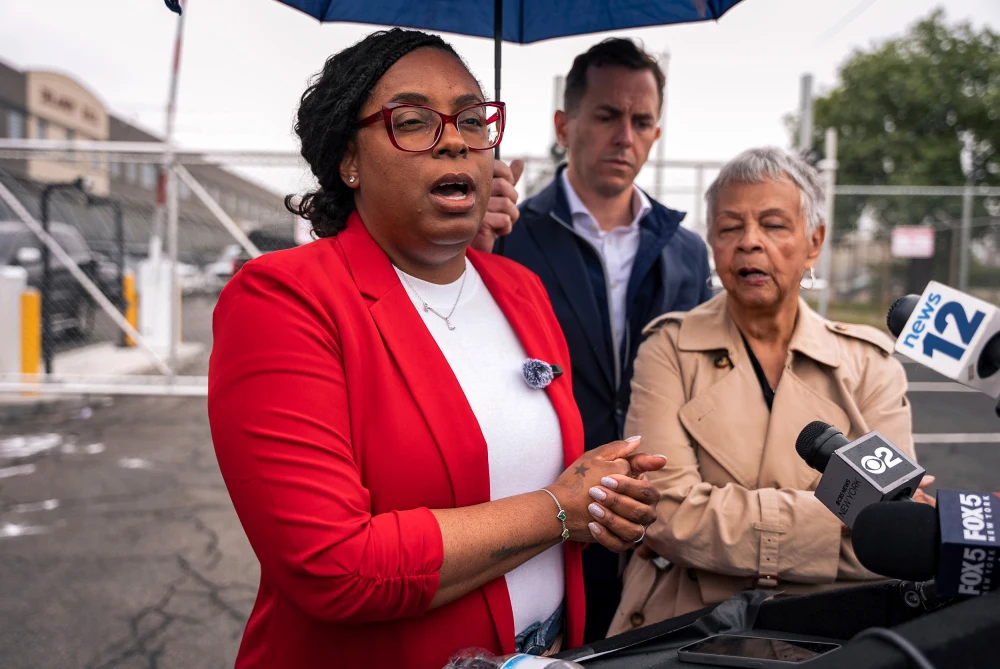LaMonica McIver, a name that has recently made headlines, now faces serious legal consequences after being indicted on multiple charges for allegedly assaulting federal law enforcement officers. The charges stem from an incident that took place during a tumultuous period of unrest, in which McIver allegedly engaged in violent acts against federal officers who were deployed to maintain order. As a result, McIver now faces the possibility of spending up to 17 years in prison, should the charges be proven in court.

The indictment has left many wondering about the details of the case and what led to the confrontation. McIver, who was previously relatively unknown to the public, is now at the center of a legal battle that could have far-reaching consequences. Federal authorities have charged McIver with assaulting officers, a crime that is taken very seriously under U.S. law, especially when those officers are part of federal law enforcement agencies like the FBI, U.S. Marshals, or other federal agents.
According to the indictment, McIver’s actions were not an isolated incident but part of a broader wave of violence and unrest that has affected various parts of the country. Federal officers have been called into action in several locations over the past few years, responding to protests, demonstrations, and incidents that have sometimes escalated into violent confrontations. McIver’s alleged assault on federal officers is one such incident, drawing attention to the broader issue of how the law should respond to violence against law enforcement.

The severity of the charges is significant. McIver faces a possible sentence of up to 17 years in federal prison, depending on the specifics of the case and the evidence presented in court. Federal sentencing guidelines are strict, and assaulting federal officers is regarded as a serious offense that carries heavy penalties. The maximum sentence reflects the gravity with which the justice system views any violence directed at those who are sworn to uphold the law. McIver’s legal team will likely attempt to mount a defense, but the stakes are high, and the consequences are clear.
The case has sparked considerable debate, particularly given the current climate surrounding law enforcement and the ongoing national conversations about police accountability, use of force, and the treatment of protesters. Supporters of McIver may argue that the context of the confrontation matters—that McIver may have been acting in the heat of a protest or in a moment of extreme frustration with federal actions. On the other hand, critics argue that the use of violence against law enforcement, regardless of the circumstances, cannot be tolerated as it undermines the rule of law and the safety of those who are tasked with maintaining order.
This case is also a reflection of the ongoing tensions between local movements and federal authorities. Over the last few years, there have been several instances where federal law enforcement was deployed to control protests and demonstrations, often leading to clashes between citizens and officers. McIver’s case adds to the growing list of individuals facing charges related to violence against law enforcement, which has sparked a broader conversation about the role of federal officers in managing protests and the potential consequences of such confrontations.
At the same time, McIver’s indictment serves as a reminder of the importance of due process and the legal protections that come with a fair trial. While the charges are serious and the potential sentence is severe, McIver, like any accused individual, is entitled to the presumption of innocence until proven guilty in a court of law. The legal process will determine whether McIver’s actions were justified or whether they constituted a criminal assault on federal officers.
As the case proceeds, it will be closely watched by both legal experts and the general public. The outcome will likely have implications for similar cases involving violent encounters with law enforcement, particularly during times of unrest and protest. It may also influence the national discourse surrounding the relationship between law enforcement and communities, especially in the context of growing calls for police reform and accountability.
In conclusion, LaMonica McIver’s indictment for allegedly assaulting federal law enforcement officers is a significant development that will play out in the courtroom in the coming months. With a potential sentence of up to 17 years in prison, McIver faces a long and challenging legal battle. The case raises important questions about the nature of protest, the use of force, and the consequences of violence against law enforcement. It is a stark reminder of the complexities involved in addressing lawlessness while ensuring the rights and safety of all individuals, and the legal process will ultimately determine McIver’s fate.